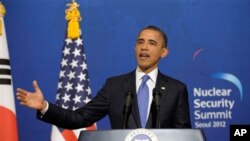“Securing the world’s nuclear weapons and preventing nuclear terrorism” is “one of the most urgent challenges of global security,” U.S. President Barack Obama said when attending the 2012 Nuclear Security Summit in Seoul, South Korea. “We know that just the smallest amount of plutonium -- about the size of an apple -- could kill hundreds of thousands and spark a global crisis.”
Leaders from 54 countries, along with the heads of four international organizations - the United Nations, the International Atomic Energy Agency, the European Union, and Interpol, also attended 2012 Nuclear Security Summit.
The Summit was directed at securing the loose nuclear materials that could potentially fall into the hands of terrorists, and pose an extraordinary threat to countries around the world. “The international community has made it harder than ever for terrorists to acquire nuclear weapons, and that has made us all safer,” President Obama said.
“We're building an international architecture that can ensure nuclear safety. But we're under no illusions. We know that nuclear material, enough for many weapons, is still being stored without adequate protection.”
American leadership has been essential to progress in a second area towards a world without nuclear weapons. “My administration recognizes that the massive nuclear arsenal we inherited from the Cold War is poorly suited to today's threats,” President Obama said.
“I firmly believe that we can ensure the security of the United States and our allies and still pursue further reductions in our nuclear arsenal. We'll continue to seek discussions with Russia [and] working together, we can continue to reduce our nuclear stockpiles.”
Progress in a third area is in the strengthening of the global architecture that prevents the spread of nuclear weapons.
“When I came into office, the cornerstone of the world's effort -- which is the Nuclear Non-Proliferation Treaty -- was fraying,” President Obama said.
“Over the past three years we've enhanced the global partnership that prevents proliferation. We've upheld the basic bargain of the Nuclear Non-Proliferation Treaty: Countries with nuclear weapons, like the United States and Russia, will move towards disarmament; countries without nuclear weapons will not acquire them; and all countries can have access to peaceful nuclear energy.”
Obama On Nuclear Security

“Securing the world’s nuclear weapons and preventing nuclear terrorism” is “one of the most urgent challenges of global security."



